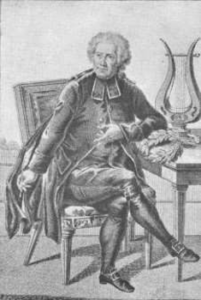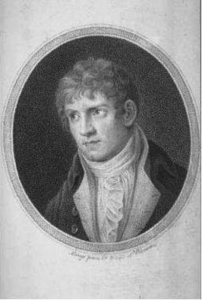The pains of separation
(Poet's title: Leiden der Trennung)
Set by Schubert:
D 509
[December 1816]
Vom Meere trennt sich die Welle,
Und seufzet durch Blumen im Tal,
Und fühlet, gewiegt in der Quelle,
Gebannt in dem Brunnen nur Qual!
Es sehnt sich die Welle,
In lispelnder Quelle,
Im murmelnden Bache,
Im Brunnengemache
Zum Meer, von dem sie kam,
Aus dem sie Leben nahm,
Von dem, des Irrens matt und müde,
Sie süße Ruh verhofft und Friede.
The wave separates itself from the sea,
And sighs through the flowers in the valley,
And it feels cradled in the spring
Spellbound in the fountain – just agony!
The wave is feeling longing
In the whispering spring,
In the babbling brook,
In the bowl of the fountain,
It is longing for the sea, from which it came,
From which it took its life,
From which, weak and tired after its travels,
It hopes for sweet rest and peace.
All translations into English that appear on this website, unless otherwise stated, are by Malcolm Wren. You are free to use them on condition that you acknowledge Malcolm Wren as the translator and schubertsong.uk as the source. Unless otherwise stated, the comments and essays that appear after the texts and translations are by Malcolm Wren and are © Copyright.
☙
Themes and images in this text:
The ancient world Cradles Detours and delusions Flowers Home (Heimat) Longing and yearning Pain Rivers (Bach) The sea Sighs and sighing Springs, sources and fountains Sweetness Valleys Waves – Welle
Over a hundred composers appear to have created an opera based on Metastasio’s Artaserse. This aria comes at the point where Artaserse is saving Arbace’s life (in gratitude for putting loyalty to the crown above loyalty to his own father, the scheming Artabano) and urging him to flee to safety. Metastasio’s original Italian was designed as a basic structure to give singers and composers scope to develop and decorate the music in order to expand the range of emotions being expressed; a direct comparison between the original and Collin’s German translation shows that Collin took the opportunity to add his own commentary and development to the text.
L’onda dal mar divisa
Bagna la valle e’l monte,
Va passeggera
In fiume,
Va prigioniera
In fonte,
Mormora sempre e geme
Fin che non torna al mar:
Al mar, dov’ ella nacque,
Dove acquistò gli umori
Dove da’lunghi errori
Spera di riposar.
The wave, cut off from the sea,
Bathes the valley and the mountain,
It travels as a passenger
In the river,
It travels as a prisoner
Into the fountain,
It always murmurs and groans
Since it has not returned to the sea:
To the sea, where it was born,
Where it acquired its characteristics,
Where, after long excursions,
It hopes to rest.
Collin’s major addition to Metastasio’s text is probably the verb ‘sehnen’ – to long or to yearn. The wave’s sighing, whispering and murmuring are all expressions of the basic longing to return to its origins in the sea. Even when it is in the source of a river as it wells up or springs from a hillside it is cut off from its true ‘source’. This longing for the source, the ‘Quelle’, induces agony, ‘Qual’ (another word / concept introduced in Collin’s version). Only after a number of detours will the wave return and find peace in the sea. In this final image the Italian and German vocabulary is surprisingly close: ‘des Irrens matt und müde’ (weary and tired of ‘wandering about’, though with connotations of ‘going mad’) is a close echo of ‘da’lunghi errori’ (after long excursions, with connotations of ‘going wrong’ or ‘taking the wrong turning’).
The central ideas are therefore very similar to those running through Goethe’s ‘Gesang der Geister über den Wassern‘ (D 484 D 538 D 705 D 714): the water cycle is an image of the human soul in its perpetual desire to move onwards and ultimately back to where it belongs. The restlessness of water, its rushing and gushing, is attributed to the fact that it can never be at peace while it is wandering about and meandering in an alien environment. So it is with the restless human spirit. Whether we are bursting with creativity (like a bubbling spring) or channelled into intricate forms of human culture (like water in a fountain in a town square), ultimately we are cut off from the true source of our life, from the formless infinite sea where we were born.
☙
Original Spelling Leiden der Trennung Vom Meere trennt sich die Welle, Und seufzet durch Blumen im Thal, Und fühlet gewiegt in der Quelle, Gebannt in dem Brunnen - nur Qual! Sie sehnt sich, die Welle, In lispelnder Quelle, Im murmelnden Bache, Im Brunnengemache Zum Meer, von dem sie kam, Aus dem sie Leben nahm, Von dem, des Irrens matt und müde, Sie süße Ruh verhofft und Friede.
Confirmed by Peter Rastl with Tutte le opere di Pietro Metastasio, Firenze, Tipografia Borghi e compagni 1832, page 150.
The text appears in Artaserse, atto III, scena I (Arbace’s aria).
Confirmed by Peter Rastl with Schubert’s probable source, Heinrich J. v. Collin’s sämmtliche Werke. Vierter Band. Epische und lyrische Gedichte. Wien, 1813. Gedruckt und im Verlage bey Anton Strauß. In Commission bey Carl Schaumburg und Comp. / Anton Doll; and with Gedichte von H. J. v. Collin. Wien, 1812. Gedruckt und im Verlage bey Anton Strauß, page 26.
To see an early edition of the text, go to page 40 [50 von 388] here: http://digital.onb.ac.at/OnbViewer/viewer.faces?doc=ABO_%2BZ251554008



